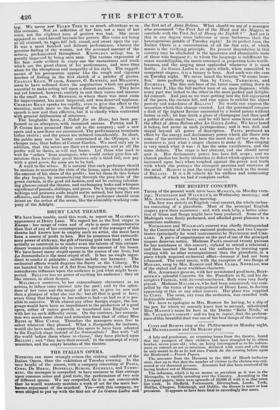THE COVENT GARDEN COMPANY
SWARMED at that little hive of a theatre, the Olympic, on Wednes- day night. Previous to the performance of SHERIDAN KNOWLES'S Wife, an address written by its author was spoken by WARDE.
The Olympic is perhaps nearly as much too small for represent- ing the regular drama with due scenic effect, as the Great Theatres are too large for conveying to the audience the many delicate lights and shades that mark a fine personation. But the 'fault is on the right side, especially in the instance of such a play as the Wife; where the beauties of poetry and sentiment constitute so large a portion of its interest, and in the acting of which so much. depends upon the feeling and expression with which the dialogue is delivered. The play, as now performed, is greatly improved beyond the first representation ; partly by the judicious alterations of the author, and partly by the greater completeness of the act- ing. We never saw ELLEN TREE to so much advantage as on this occasion. Not. an inflection of her face, not a tone of her voice, not the slightest turn of gesture was lost. She never appeared to exert herself beyonds her powers. Her voice not being at all strained, its toes fell full, round, and sweet upon the ear. It was a most finished and delicate performance, wherein the genuine feeling of the woman, not the assumed manner of the actress, predominated throughout. KNowees's acting, too, is greatly improved by being seen near. The various expression of his face made evident to every one the earnestness and truth which are the great charm of his performance, and more than atone for the abruptness and inequality of his style. The rugged- nesses of his personation appear like the rough and vigorous touches of feeline° in the first sketch of a painter of genius. CHARLES KEAN, WARDE, ABBOTT, G. BENNETT, and MEADOWS, seem to have softened down the angularities which are perhaps essential to make acting tell upon a distant audience. They have not yet learned, however, entirely to suit their voices and manner to the small area. G. BENNETT, in whom there was most room for improvement, has most improved, and won deserved applause. CHARLES KEAN speaks too rapidly, even to give due effect to the meaning, much more to the feeling of the dialogue. A hurried speech is now and than effective, but it is chiefly when contrasted with general deliberation of utterance. The laughable farce, A Nabob for an Hour, has been per- formed as an afterpiece, with increased success. POWER and T. P. COOKE have promised their aid to the company; and a new opera and a new farce are announced. The performances terminate before twelve ; and the prices are reduced considerably. In short, the public may now be better entertained at the Olympic, at a cheaper rate, than before at Covent Garden. We need only say in addition, that the actors are their own managers, and as all the profits will be theirs, so will any losses. Let those who used to wait for "orders" from managers, who would rather give free ad- missions than have their great theatres only a third full, now pay with a good grace, for none are to be had. A word to the actors. It is natural that each performer should be anxious to ascertain the state of the house, upon which depends the amount of his share of the profits ; but let them do this before the play begins, by reconnoitering through the peep-hole of the green curtain, in the good old fashion, and not be casting calculat- ing glances round the theatre, and exchanging looks and whispers significant of pounds, shillings, and pence. On a larger stage, these talkings and gestures aside might not be noticed, but here they are offensive, and destroy the illusion. Every performer should seem intent on the action of the scene, like the admirably-working com- pany of the Adelphi.



















 Previous page
Previous page